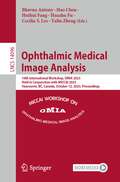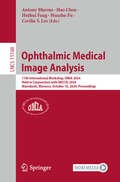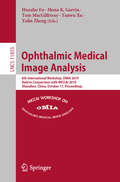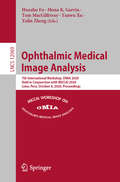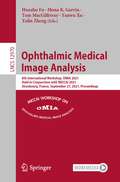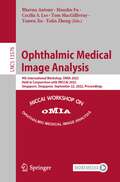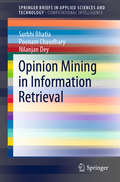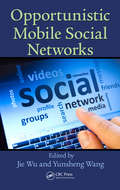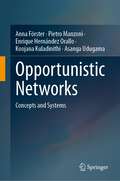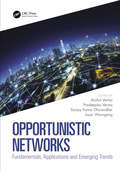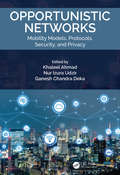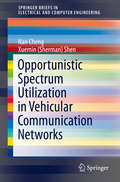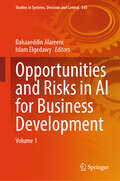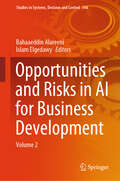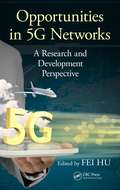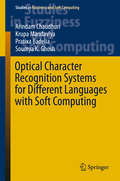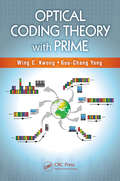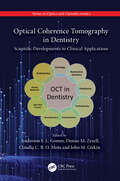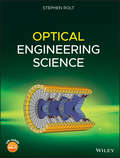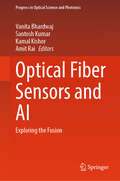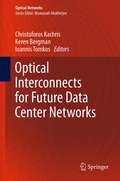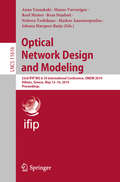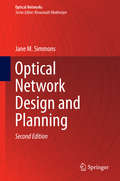- Table View
- List View
Ophthalmic Medical Image Analysis: 10th International Workshop, OMIA 2023, Held in Conjunction with MICCAI 2023, Vancouver, BC, Canada, October 12, 2023, Proceedings (Lecture Notes in Computer Science #14096)
by Huazhu Fu Yalin Zheng Hao Chen Bhavna Antony Cecilia S. Lee Huihui FangThis book constitutes the refereed proceedings of the 10th International Workshop on Ophthalmic Medical Image Analysis, OMIA 2023, held in conjunction with the 26th International Conference on Medical Imaging and Computer-Assisted Intervention, MICCAI 2023, in Vancouver, Canada, in October 2023.The 16 papers presented at OMIA 2023 were carefully reviewed and selected from 27 submissions. The papers cover various topics in the field of ophthalmic medical image analysis and challenges in terms of reliability and validation, number and type of conditions considered, multi-modal analysis (e.g., fundus, optical coherence tomography, scanning laser ophthalmoscopy), novel imaging technologies, and the effective transfer of advanced computer vision and machine learning technologies.
Ophthalmic Medical Image Analysis: 11th International Workshop, OMIA 2024, Held in Conjunction with MICCAI 2024, Marrakesh, Morocco, October 10, 2024, Proceedings (Lecture Notes in Computer Science #15188)
by Huazhu Fu Hao Chen Cecilia S. Lee Huihui Fang Antony BhavnaThis book constitutes the refereed proceedings of the 11th International Workshop on Ophthalmic Medical Image Analysis, OMIA 2024, held in conjunction with the 27th International Conference on Medical Imaging and Computer-Assisted Intervention, MICCAI 2024, in Marrakesh, Morocco, in October 2024. The 16 papers presented in this book were carefully reviewed and selected from 31 submissions. The papers cover various topics such as computer-aided detection and diagnosis of disease; image analysis of novel ophthalmic imaging modalities; multimodal ophthalmic image analysis; ophthalmic image atlases; ophthalmic image analysis in animals; registration of ophthalmic images, including multimodal, segmentation of structures (e.g., vasculature, lesions, landmarks), combined analysis of images of the eye and other organs; validation; and/or crowd sourcing.
Ophthalmic Medical Image Analysis: 6th International Workshop, OMIA 2019, Held in Conjunction with MICCAI 2019, Shenzhen, China, October 17, Proceedings (Lecture Notes in Computer Science #11855)
by Yanwu Xu Mona K. Garvin Huazhu Fu Tom MacGillivray Yalin ZhengThis book constitutes the refereed proceedings of the 6th International Workshop on Ophthalmic Medical Image Analysis, OMIA 2019, held in conjunction with the 22nd International Conference on Medical Imaging and Computer-Assisted Intervention, MICCAI 2019, in Shenzhen, China, in October 2019. The 22 full papers (out of 36 submissions) presented at OMIA 2019 were carefully reviewed and selected. The papers cover various topics in the field of ophthalmic image analysis.
Ophthalmic Medical Image Analysis: 7th International Workshop, OMIA 2020, Held in Conjunction with MICCAI 2020, Lima, Peru, October 8, 2020, Proceedings (Lecture Notes in Computer Science #12069)
by Yanwu Xu Mona K. Garvin Huazhu Fu Tom MacGillivray Yalin ZhengThis book constitutes the refereed proceedings of the 6th International Workshop on Ophthalmic Medical Image Analysis, OMIA 2020, held in conjunction with the 23rd International Conference on Medical Imaging and Computer-Assisted Intervention, MICCAI 2020, in Lima, Peru, in October 2020. The workshop was held virtually due to the COVID-19 crisis.The 21 papers presented at OMIA 2020 were carefully reviewed and selected from 34 submissions. The papers cover various topics in the field of ophthalmic medical image analysis and challenges in terms of reliability and validation, number and type of conditions considered, multi-modal analysis (e.g., fundus, optical coherence tomography, scanning laser ophthalmoscopy), novel imaging technologies, and the effective transfer of advanced computer vision and machine learning technologies.
Ophthalmic Medical Image Analysis: 8th International Workshop, OMIA 2021, Held in Conjunction with MICCAI 2021, Strasbourg, France, September 27, 2021, Proceedings (Lecture Notes in Computer Science #12970)
by Yanwu Xu Mona K. Garvin Huazhu Fu Tom MacGillivray Yalin ZhengThis book constitutes the refereed proceedings of the 8th International Workshop on Ophthalmic Medical Image Analysis, OMIA 2021, held in conjunction with the 24th International Conference on Medical Imaging and Computer-Assisted Intervention, MICCAI 2021, in Strasbourg, France, in September 2021.* The 20 papers presented at OMIA 2021 were carefully reviewed and selected from 31 submissions. The papers cover various topics in the field of ophthalmic medical image analysis and challenges in terms of reliability and validation, number and type of conditions considered, multi-modal analysis (e.g., fundus, optical coherence tomography, scanning laser ophthalmoscopy), novel imaging technologies, and the effective transfer of advanced computer vision and machine learning technologies. *The workshop was held virtually.
Ophthalmic Medical Image Analysis: 9th International Workshop, OMIA 2022, Held in Conjunction with MICCAI 2022, Singapore, Singapore, September 22, 2022, Proceedings (Lecture Notes in Computer Science #13576)
by Yanwu Xu Huazhu Fu Tom MacGillivray Yalin Zheng Bhavna Antony Cecilia S. LeeThis book constitutes the refereed proceedings of the 9th International Workshop on Ophthalmic Medical Image Analysis, OMIA 2022, held in conjunction with the 25th International Conference on Medical Imaging and Computer-Assisted Intervention, MICCAI 2022, in Singapore, Singapore, in September 2022.The 20 papers presented at OMIA 2022 were carefully reviewed and selected from 33 submissions. The papers cover various topics in the field of ophthalmic medical image analysis and challenges in terms of reliability and validation, number and type of conditions considered, multi-modal analysis (e.g., fundus, optical coherence tomography, scanning laser ophthalmoscopy), novel imaging technologies, and the effective transfer of advanced computer vision and machine learning technologies.
Opinion Mining in Information Retrieval (SpringerBriefs in Applied Sciences and Technology)
by Nilanjan Dey Surbhi Bhatia Poonam ChaudharyThis book discusses in detail the latest trends in sentiment analysis,focusing on “how online reviews and feedback reflect the opinions of users and have led to a major shift in the decision-making process at organizations.” Social networking has become essential in today’s society. In the past, people’s decisions to buy certain products (and companies’ efforts to sell them) were largely based on advertisements, surveys, focus groups, consultants, and the opinions of friends and relatives. But now this is no longer limited to one’s circle of friends, family or small surveys;it has spread globally to online social media in the form of blogs, posts, tweets, social networking sites, review sites and so on. Though not always easy, the transition from surveys to social media is certainly lucrative. Business analytical reports have shown that many organizations have improved their sales, marketing and strategy, setting up new policies and making decisions based on opinion mining techniques.
Opportunistic Mobile Social Networks
by Jie Wu Yunsheng WangThe widespread availability of mobile devices along with recent advancements in networking capabilities make opportunistic mobile social networks (MSNs) one of the most promising technologies for next-generation mobile applications. Opportunistic Mobile Social Networks supplies a new perspective of these networks that can help you enhance spontaneo
Opportunistic Networks: Concepts and Systems
by Anna Förster Pietro Manzoni Enrique Hernández Orallo Koojana Kuladinithi Asanga UdugamaThis textbook provides an exhaustive exploration of Opportunistic Networks (OppNets). Divided into three parts, it starts with the foundational principles and metrics of OppNets, detailing their mobility and data dissemination. Significant focus is given to the security challenges faced by OppNets, including strategies to counter various attacks. The second part evaluates OppNets, introducing methods and metrics for assessment, theoretical and simulation models, and tools such as OMNeT++, The ONE and ns-3.This textbook also offers comparative analyses and discussions on benchmarking. The third part delves into the implementation of OppNets, discussing technologies from Mobile Ad Hoc Networks to satellite communication and their integration with cellular technologies like 4G, 5G and 6G. Detailed insight into device characterization reveals the potential and limitations of devices within OppNets. Practical applications of OppNets in scenarios such as disaster management, remotecommunication, IoT challenges, smart cities and satellite networks are presented as well. Through detailed discussions and case studies, readers gain a comprehensive understanding of the structure, operation and practical implications of OppNets. It equips readers with knowledge to appreciate the vast potential of OppNets in various applications and settings.This textbook targets advanced-level students and postdocs in computer science and electrical engineering as well as researchers, who are starting new in the area and need a comprehensive view of opportunistic networks. Practitioners who are interested in applying the concepts of opportunistic networks in their products and services, and would like to have a jump start into the development and applications of opportunistic networks will also want to purchase this book as a reference.
Opportunistic Networks: Fundamentals, Applications and Emerging Trends
by Isaac Woungang Anshul Verma Sanjay Kumar Dhurandher Pradeepika VermaThe opportunistic network is an emerging and recent area of research. To make this research area more adaptable for practical and industrial use, there is a need to further investigate several research challenges in all aspects of opportunistic networks. Therefore, Opportunistic Networks: Fundamentals, Applications and Emerging Trends provides theoretical, algorithmic, simulation, and implementation-based research developments related to fundamentals, applications, and emerging research trends in opportunistic networks. The book follows a theoretical approach to describe fundamentals to beginners and incorporates a practical approach depicting the implementation of real-life applications to intermediate and advanced readers. This book is beneficial for academicians, researchers, developers, and engineers who work in or are interested in the fields related to opportunistic networks, delay tolerant networks, and intermittently connected ad hoc networks. This book also serves as a reference book for graduate and postgraduate courses in computer science, computer engineering, and information technology streams.
Opportunistic Networks: Mobility Models, Protocols, Security, and Privacy
by Ganesh Chandra Deka Khaleel Ahmad Nur Izura UdzirOpportunistic networks allow mobile users to share information without any network infrastructure.This book is suitable for both undergraduates and postgraduates as it discusses various aspects of opportunistic networking including, foundations of ad hoc network; taxonomy of mobility models, etc.
Opportunistic Spectrum Utilization in Vehicular Communication Networks
by Xuemin Sherman Shen Nan ChengThis brief examines current research on improving Vehicular Networks (VANETs), examining spectrum scarcity due to the dramatic growth of mobile data traffic and the limited bandwidth of dedicated vehicular communication bands and the use of opportunistic spectrum bands to mitigate congestion. It reviews existing literature on the use of opportunistic spectrum bands for VANETs, including licensed and unlicensed spectrum bands and a variety of related technologies, such as cognitive radio, WiFi and device-to-device communications. Focused on analyzing spectrum characteristics, designing efficient spectrum exploitation schemes, and evaluating the date delivery performance when utilizing different opportunistic spectrum bands, the results presented in this brief provide valuable insights on improving the design and deployment of future VANETs.
Opportunities and Risks in AI for Business Development: Volume 1 (Studies in Systems, Decision and Control #545)
by Islam Elgedawy Bahaaeddin AlareeniThis book presents a groundbreaking exploration into the dynamic synergy between artificial intelligence and business development. Titled "AI Integration for Business Development: Navigating Opportunities, Unleashing Potential, Managing Risks," it serves as an indispensable guide for leaders and visionaries aiming to harness the transformative power of AI. The book introduces a comprehensive journey that unveils the strategic integration of AI into business development strategies. This book shows how to navigate a myriad of opportunities, strategically unleash untapped potential, and adeptly manage risks in the ever-evolving landscape of artificial intelligence. Through meticulous insights, real-world examples, and actionable strategies, readers gain the knowledge to make informed decisions and drive competitive advantage. This book presents not only a roadmap for identifying lucrative opportunities but also a blueprint for unlocking the full potential of AI technologies. Whether you are a seasoned executive, entrepreneur, or decision-maker, this book empowers you to proactively manage risks inherent in AI adoption, ensuring resilience and adaptability in your business model. Discover how to stay ahead in the rapidly changing business landscape, shaping the future of your business development initiatives. This book is your indispensable companion, offering profound insights into AI integration and empowering you to seize the transformative potential of AI. This book is your key to charting a course toward sustained success and innovation in the dynamic world of modern business.
Opportunities and Risks in AI for Business Development: Volume 2 (Studies in Systems, Decision and Control #546)
by Islam Elgedawy Bahaaeddin AlareeniThis book presents a groundbreaking exploration into the dynamic synergy between artificial intelligence and business development. Titled "AI Integration for Business Development: Navigating Opportunities, Unleashing Potential, Managing Risks," it serves as an indispensable guide for leaders and visionaries aiming to harness the transformative power of AI. The book introduces a comprehensive journey that unveils the strategic integration of AI into business development strategies. This book shows how to navigate a myriad of opportunities, strategically unleash untapped potential, and adeptly manage risks in the ever-evolving landscape of artificial intelligence. Through meticulous insights, real-world examples, and actionable strategies, readers gain the knowledge to make informed decisions and drive competitive advantage. This book presents not only a roadmap for identifying lucrative opportunities but also a blueprint for unlocking the full potential of AI technologies. Whether you are a seasoned executive, entrepreneur, or decision-maker, this book empowers you to proactively manage risks inherent in AI adoption, ensuring resilience and adaptability in your business model. Discover how to stay ahead in the rapidly changing business landscape, shaping the future of your business development initiatives. This book is your indispensable companion, offering profound insights into AI integration and empowering you to seize the transformative potential of AI. This book is your key to charting a course toward sustained success and innovation in the dynamic world of modern business.
Opportunities in 5G Networks: A Research and Development Perspective
by Fei HuOpportunities in 5G Networks: A Research and Development Perspective uniquely focuses on the R&D technical design of 5th-generation (5G) networks. It is written and edited by researchers and engineers who are world-renown experts in the design of 5G networks. The book consists of four sections: The first section explains what 5G is, what its re
Optical Character Recognition Systems for Different Languages with Soft Computing
by Arindam Chaudhuri Soumya K. Ghosh Krupa Mandaviya Pratixa BadeliaThe book offers a comprehensive survey of soft-computing models for optical character recognition systems. The various techniques, including fuzzy and rough sets, artificial neural networks and genetic algorithms, are tested using real texts written in different languages, such as English, French, German, Latin, Hindi and Gujrati, which have been extracted by publicly available datasets. The simulation studies, which are reported in details here, show that soft-computing based modeling of OCR systems performs consistently better than traditional models. Mainly intended as state-of-the-art survey for postgraduates and researchers in pattern recognition, optical character recognition and soft computing, this book will be useful for professionals in computer vision and image processing alike, dealing with different issues related to optical character recognition.
Optical Coding Theory with Prime
by Wing C. Kwong Guu-Chang YangAlthough several books cover the coding theory of wireless communications and the hardware technologies and coding techniques of optical CDMA, no book has been specifically dedicated to optical coding theory—until now. Written by renowned authorities in the field, Optical Coding Theory with Prime gathers together in one volume the fundamentals and developments of optical coding theory, with a focus on families of prime codes, supplemented with several families of non-prime codes. The book also explores potential applications to coding-based optical systems and networks. Learn How to Construct and Analyze Optical Codes The authors use a theorem-proof approach, breaking down theories into digestible form so that readers can understand the main message without searching through tedious proofs. The book begins with the mathematical tools needed to understand and apply optical coding theory, from Galois fields and matrices to Gaussian and combinatorial analytical tools. Using a wealth of examples, the authors show how optical codes are constructed and analyzed, and detail their performance in a variety of applications. The book examines families of 1-D and 2-D asynchronous and synchronous, multilength, and 3-D prime codes, and some non-prime codes. Get a Working Knowledge of Optical Coding Theory to Help You Design Optical Systems and Networks Prerequisites include a basic knowledge of linear algebra and coding theory, as well as a foundation in probability and communications theory. This book draws on the authors’ extensive research to offer an authoritative reference on the emerging field of optical coding theory. In addition, it supplies a working knowledge of the theory and optical codes to help readers in the design of coding-based optical systems and networks. For more on the technological aspects of optical CDMA, see Optical Code Division Multiple Access: Fundamentals and Applications (CRC Press 2005).
Optical Coherence Tomography in Dentistry: Scientific Developments to Clinical Applications (Series in Optics and Optoelectronics)
by Gomes, Anderson S. L.Optical Coherence Tomography (OCT), a method to "see inside of things" without destroying them, has been applied to subjects ranging from materials science to medicine. This book focuses on the biomedical application of OCT in dentistry, covering topics from dental materials to clinical practice. Since the introduction of the OCT method in ophthalmology in 1991, and then dentistry in 1998, developments in OCT methods, particularly in biomedical areas, have led to its dissemination worldwide. The chapters of this book cover the basics and recent global advances of OCT in dentistry, including an overview of the method and its use in cariology, restorative dentistry, dental materials, endodontics, pediatric dentistry, orthodontics, prosthodontics, soft oral tissues and nanodentistry. This book will be of interest to both newcomers in the field as well as those already working in OCT, either in research and/or the clinic. It will be of great use in courses on optical imaging applied to biomedical areas, particularly where it can provide real-life examples of the application of OCT.
Optical Electromagnetic Field Analysis Using Python: Practical Application in Metallic and Dielectric Nanostructures
by Kotaro Kajikawa Takayuki OkamotoIn this book, Kajikawa and Okamoto explain how to use Python to calculate and visualize the optical response of microscopic structures and systems. Throughout, the authors provide varied examples to instruct readers in the application of theoretical knowledge to real-world scenarios.Electromagnetic field analysis is often necessary to determine the optical response of materials with microscopic structures. Although the principles are widely described, the manual calculation and visualization of results are not and remain challenging. Python is the ideal language to use for this as it has a large functional library for visualizing analysis results and is suitable for programming beginners to use at low cost, so it has many advantages over languages like Fortran, BASIC, and C. Here, the authors introduce the application of Python to various electromagnetic field analysis scenarios in the field of nanophotonics. The first half of the book describes cases in which there is an analytical solution for the structure and addresses scenarios such as scattering and absorption in spherical and cylindrical structures and complex structures such as rotating ellipsoids, sphere-aggregated structures, and hemispherical structures. The second half describes methods including rigorous coupling wave analysis, finite-difference time-domain method and discrete dipole approximation for numerically solving varied structures. This book enables readers to conduct their own electromagnetic field analysis quickly, cheaply, and accurately without in-depth study of other complicated and time-consuming approaches or programs.This book is invaluable for researchers and postgraduate students working in the fields of optics and photonics. Additionally, the contents are useful not only for those conducting electromagnetic field analysis but also those simulating physical, chemical, and biological phenomena.
Optical Engineering Science
by Stephen RoltA practical guide for engineers and students that covers a wide range of optical design and optical metrology topics Optical Engineering Science offers a comprehensive and authoritative review of the science of optical engineering. The book bridges the gap between the basic theoretical principles of classical optics and the practical application of optics in the commercial world. Written by a noted expert in the field, the book examines a range of practical topics that are related to optical design, optical metrology and manufacturing. The book fills a void in the literature by coving all three topics in a single volume. Optical engineering science is at the foundation of the design of commercial optical systems, such as mobile phone cameras and digital cameras as well as highly sophisticated instruments for commercial and research applications. It spans the design, manufacture and testing of space or aerospace instrumentation to the optical sensor technology for environmental monitoring. Optics engineering science has a wide variety of applications, both commercial and research. This important book: Offers a comprehensive review of the topic of optical engineering Covers topics such as optical fibers, waveguides, aspheric surfaces, Zernike polynomials, polarisation, birefringence and more Targets engineering professionals and students Filled with illustrative examples and mathematical equations Written for professional practitioners, optical engineers, optical designers, optical systems engineers and students, Optical Engineering Science offers an authoritative guide that covers the broad range of optical design and optical metrology topics and their applications.
Optical Fiber Sensors and AI: Exploring the Fusion (Progress in Optical Science and Photonics #34)
by Santosh Kumar Amit Rai Vanita Bhardwaj Kamal KishorThis book highlights the exciting developments in optical fiber sensors and how artificial intelligence (AI) is boosting their performance and applications. It starts with an easy-to-understand introduction to the basics of optical fiber sensors and their many uses. Then, it moves on to the latest technological advancements, showing how AI is making these sensors smarter and more efficient. The book contains chapters demonstrating how machine learning contributes to real-time data analysis and how deep learning enhances sensor systems. There is also a focus on designing better sensor networks with the help of AI. The book explains how combining AI with the Internet of Things (IoT) and optical fiber sensors can create smart infrastructure solutions. Real-world case studies illustrate how AI-enhanced fiber-optic sensors are benefiting fields like healthcare and environmental monitoring. The book wraps up with a look at future trends and challenges in the world of AI-powered optical fiber sensing. This book is perfect for researchers, engineers, and anyone interested in the powerful combination of AI and optical fiber technology. It provides valuable insights into how these technologies can work together to create innovative and practical solutions.
Optical Interconnects for Future Data Center Networks
by Christoforos Kachris Ioannis Tomkos Keren BergmanOptical Interconnects in Future Data Center Networks covers optical networks and how they can be used to provide high bandwidth, energy efficient interconnects for future data centers with increased communication bandwidth requirements. This contributed volume presents an integrated view of the future requirements of the data centers and serves as a reference work for some of the most advanced solutions that have been proposed by major universities and companies. Collecting the most recent and innovative optical interconnects for data center networks that have been presented in the research community by universities and industries, this book is a valuable reference to researchers, students, professors and engineers interested in the domain of high performance interconnects and data center networks. Additionally, Optical Interconnects in Future Data Center Networks provides invaluable insights into the benefits and advantages of optical interconnects and how they can be a promising alternative for future data center networks.
Optical Network Design and Modeling: 23rd IFIP WG 6.10 International Conference, ONDM 2019, Athens, Greece, May 13–16, 2019, Proceedings (Lecture Notes in Computer Science #11616)
by Johann Marquez-Barja Anna Tzanakaki Manos Varvarigos Raul Muñoz Reza Nejabati Noboru Yoshikane Markos AnastasopoulosThis book constitutes the refereed proceedings of the 23rd International IFIP conference on Optical Network Design and Modeling, ONDM 2019, held in Athens, Greece, in May 2019. The 39 revised full papers were carefully reviewed and selected from 87 submissions. The papers focus on cutting-edge research in established areas of optical networking as well as their adoption in support of a wide variety of new services and applications. This involves the most recent trends in networking including 5G and beyond, big data and network data analytics, cloud/edge computing, autonomic networking, artificial intelligence assisted networks, secure and resilient networks, that drive the need for increased capacity, efficiency, exibility and adaptability in the functions that the network can perform. In this context new disaggregated optical network architectures were discussed, exploiting and integrating novel multidimensional photonic technology solutions as well as adopting open hardware and software platforms relying on software defined networking (SDN), and network function virtualization (NFV) to allow support of new business models and opportunities.
Optical Network Design and Planning
by Jane M. SimmonsThis book takes a pragmatic approach to deploying state-of-the-art optical networking equipment in metro-core and backbone networks The book is oriented towards practical implementation of optical network design. Algorithms and methodologies related to routing, regeneration, wavelength assignment, sub rate-traffic grooming and protection are presented, with an emphasis on optical-bypass-enabled (or all-optical) networks. The author has emphasized the economics of optical networking, with a full chapter of economic studies that offer guidelines as to when and how optical-bypass technology should be deployed This new edition contains: new chapter on dynamic optical networking and a new chapter on flexible/elastic optical networks. Expanded coverage of new physical-layer technology (e. g. , coherent detection) and its impact on network design and enhanced coverage of ROADM architectures and properties, including colorless, directionless, contentionless and gridless. Covers 'hot' topics, such as Software Defined Networking and energy efficiency, algorithmic advancements and techniques, especially in the area of impairment-aware routing and wavelength assignment. Provides more illustrative examples of concepts are provided, using three reference networks (the topology files for the networks are provided on a web site, for further studies by the reader). Also exercises have been added at the end of the chapters to enhance the book's utility as a course textbook.
Optical Polymer Waveguides: From the Design to the Final 3D-Opto Mechatronic Integrated Device
by Stefan Kaierle Jörg Franke Ludger Overmeyer Klaus-Jürgen Wolter Norbert Lindlein Karlheinz Bock Oliver SuttmannLight signals in optical waveguides can be used to transmit very large amounts of data quickly and largely without interference. In the industrial and infrastructural sectors, e.g. in the automotive and aerospace industries, the demand to further exploit this potential is therefore increasing. Which technologies can be used to effectively integrate systems that transmit data by means of light into existing components? This is a central question for current research. So far, there have been some technical limitations in this regard. For example, it is difficult to couple the signal of an optical waveguide to other optical waveguides without interruption. There is also a lack of suitable fabrication technologies for three-dimensional waveguides, as well as design and simulation environments for 3D opto-MID. This book addresses these and other challenges.
